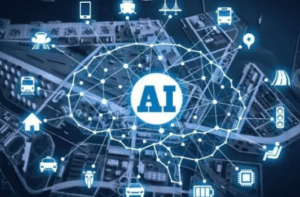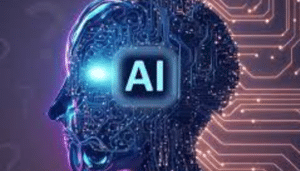What is artificial intelligence, A Journey into the Future
Artificial Intelligence (AI) is a topic that has captured the imagination of scientists, technologists, and the general public alike. From science fiction to real-world applications, AI has evolved from a mere concept to a transformative force shaping nearly every aspect of our lives. In this blog post, we’ll delve into the fascinating world of artificial intelligence, exploring its history, current applications, ethical considerations, and the boundless potential it holds for the future.

Understanding Artificial Intelligence:
At its core, artificial intelligence refers to the ability of machines to perform tasks that typically require human intelligence. This encompasses a wide range of capabilities, from understanding natural language and recognizing patterns to making decisions and learning from experience. AI can be categorized into two main types: Narrow AI, which is designed to perform specific tasks, and General AI, which possesses human-like intelligence and can adapt to a variety of tasks.

The History of Artificial Intelligence:
The roots of artificial intelligence can be traced back to ancient civilizations, where myths and legends often depicted mechanical beings with human-like attributes. However, it wasn’t until the 20th century that AI truly began to take shape as a scientific discipline. The term “artificial intelligence” was coined in 1956 during a seminal conference at Dartmouth College, where researchers laid the groundwork for the field.
In the decades that followed, AI experienced periods of both excitement and disillusionment, known as “AI summers” and “AI winters,” respectively. Major milestones, such as the development of expert systems, neural networks, and machine learning algorithms, propelled the field forward, leading to breakthroughs in areas like natural language processing, computer vision, and robotics.

Current Applications of Artificial Intelligence:
Today, artificial intelligence is all around us, powering the technology we use on a daily basis. Some common applications of AI include:
- Virtual Assistants: Virtual assistants like Siri, Alexa, and Google Assistant leverage AI to understand natural language commands and perform tasks such as setting reminders, answering questions, and controlling smart home devices.
- Recommendation Systems: Online platforms use AI algorithms to analyze user data and provide personalized recommendations for products, movies, music, and more.
- Autonomous Vehicles: AI plays a crucial role in the development of self-driving cars, enabling them to perceive their surroundings, make real-time decisions, and navigate safely on the road.
- Healthcare: AI is revolutionizing healthcare by powering diagnostic tools, predicting patient outcomes, and facilitating medical research and drug discovery.
- Finance: In the finance industry, AI algorithms analyze vast amounts of data to detect fraud, assess credit risk, and optimize investment strategies.
Ethical Considerations and Challenges:
Despite its myriad benefits, artificial intelligence also raises important ethical considerations and challenges. These include:
- Bias and Fairness: AI algorithms can inherit biases present in the data they are trained on, leading to unfair outcomes and perpetuating existing inequalities.
- Privacy and Security: The widespread use of AI raises concerns about data privacy and security, particularly when it comes to sensitive information such as personal health records or financial data.
- Job Displacement: As AI technologies automate tasks previously performed by humans, there is growing concern about job displacement and the need for workforce reskilling and upskilling.
- Autonomy and Accountability: Autonomous AI systems raise questions about accountability and responsibility in the event of errors or accidents, particularly in high-stakes domains like healthcare and transportation.
The Future of Artificial Intelligence:
Looking ahead, the future of artificial intelligence holds tremendous promise and potential. As AI technologies continue to advance, we can expect to see:
- Breakthroughs in Research: Ongoing research in areas like deep learning, reinforcement learning, and quantum computing will unlock new capabilities and push the boundaries of what AI can achieve.
- Human-AI Collaboration: AI will increasingly augment human capabilities rather than replace them, leading to new forms of collaboration and creativity across various domains.
- Ethical AI Development: There will be a greater emphasis on ethical AI development, with a focus on fairness, transparency, accountability, and inclusivity.
- AI for Good: AI will be harnessed for social good, tackling pressing global challenges such as climate change, poverty, healthcare access, and education inequality.
Types of Artificial Intelligence:
- Narrow AI (Weak AI): Narrow AI refers to artificial intelligence that is designed and trained for a specific task or set of tasks. This type of AI is highly specialized and can excel in one area, such as playing chess, driving a car, or recognizing speech. Examples of narrow AI include virtual assistants like Siri and Alexa, recommendation systems used by streaming platforms, and facial recognition software.
- General AI (Strong AI): General AI, also known as strong AI, is the theoretical concept of artificial intelligence that possesses human-like intelligence and can perform any intellectual task that a human can. Unlike narrow AI, which is focused on specific tasks, general AI would have the ability to understand, learn, and adapt to new situations and tasks. While general AI remains a long-term goal of AI research, it has not yet been achieved.
Conclusion:
Artificial intelligence is a transformative force that is reshaping the world as we know it. From its humble beginnings to its current applications and future potential, AI has come a long way in a relatively short period of time. As we navigate the complex ethical considerations and challenges posed by AI, it’s essential to approach its development and deployment with care, foresight, and a commitment to creating a future where AI benefits all of humanity. By harnessing the power of artificial intelligence responsibly and ethically, we can unlock a future of endless possibilities and usher in a new era of innovation, progress, and prosperity for generations to come.